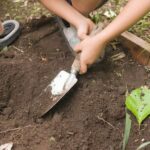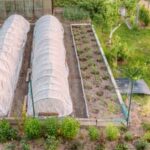Weeds can be a persistent nuisance in vegetable gardens, competing for water, sunlight, and nutrients with our precious crops. Finding a safe and effective method to kill weeds without harming our vegetables is crucial for a thriving garden. In this article, we will explore the various options available to control weeds in vegetable gardens and identify the safest methods for eliminating them.
When it comes to managing weeds in our vegetable gardens, we must consider what is safe to kill weeds on vegetable gardens without compromising the health of our edible plants. Chemical weed killers may offer a quick solution, but they come with potential risks to the environment and human health. As such, it is important to explore alternative methods that are safe and effective for maintaining a bountiful vegetable garden.
In the following sections, we will delve into the common types of weeds found in vegetable gardens and the potential harm they pose. We will also discuss the pros and cons of chemical weed killers, as well as organic alternatives that are both safe and effective.
Additionally, we will provide DIY recipes for homemade weed killers and best practices for managing weeds in vegetable gardens. With this information at hand, you can make an informed decision on choosing the safest and most effective weed control method for your vegetable garden.
Common Weeds in Vegetable Gardens
Identifying Common Weeds
One of the most common weeds found in vegetable gardens is the dandelion, with its bright yellow flowers and deep taproot. Another common weed is the crabgrass, known for its ability to quickly spread and take over a garden. Other weeds that may be found in vegetable gardens include chickweed, plantain, and purslane. Understanding the characteristics of these weeds can help gardeners effectively identify and manage them.
Potential Harm Caused by Weeds
Weeds can compete with vegetables for essential nutrients, water, and sunlight. This competition can result in stunted growth or decreased productivity of vegetable plants. Additionally, some weeds may also attract pests or diseases that could harm the vegetables in the garden. It’s important to address weed infestations promptly to prevent potential harm to the overall health of the vegetable garden.
Preventative Measures
Implementing preventative measures can help reduce weed growth and minimize their potential harm in vegetable gardens. These measures may include using mulch to suppress weed growth, regular hand-weeding to remove weeds before they become established, and maintaining healthy soil conditions through proper watering and fertilization practices.
Additionally, rotating crops and practicing companion planting can also help deter weed growth in vegetable gardens. By incorporating these preventative measures, gardeners can proactively manage weed infestations and protect the health of their vegetable plants.
Chemical Weed Killers
One of the main advantages of using chemical weed killers is their effectiveness in controlling a wide range of weeds. These products are designed to target specific types of plants, making it easier to eliminate them without causing harm to the vegetables. Additionally, many chemical weed killers provide long-lasting control, reducing the need for frequent reapplication.
On the other hand, there are several disadvantages to using chemical weed killers in vegetable gardens. One major concern is the potential harm they can cause to the environment and human health. Some herbicides contain harmful chemicals that can contaminate soil and water sources, posing risks to beneficial organisms and even humans through consumption of contaminated produce.
Moreover, over-reliance on chemical weed killers can lead to the development of herbicide-resistant weeds, making it more challenging to manage weed populations in the long run. Therefore, it is crucial for gardeners to weigh the pros and cons before deciding whether to use chemical weed killers in their vegetable gardens.
Organic Weed Control Methods
When it comes to maintaining a healthy vegetable garden, using organic weed control methods is essential for both the safety of your crops and the environment. One of the most popular organic weed control methods is mulching. Mulch helps smother weeds by blocking out sunlight and preventing weed seeds from germinating. Organic mulches such as straw, wood chips, or shredded leaves can be used to cover the soil around your vegetable plants and effectively suppress weed growth.
Another effective organic weed control method is hand-weeding. While it may be time-consuming, hand-weeding allows you to precisely target and remove weeds without causing harm to your vegetable plants. Regularly inspecting your garden and removing any weeds by hand before they have a chance to spread can prevent them from competing with your vegetables for nutrients and water.
For those looking for a natural herbicide alternative, vinegar can be a powerful weed killer when used correctly. Household vinegar with an acidity level of 5% or higher can be sprayed directly onto weeds, effectively killing them within a few days. However, it’s essential to exercise caution when applying vinegar-based herbicides as they can also harm desirable plants if not used carefully.
| Organic Weed Control Methods | Benefits |
|---|---|
| Mulching | Suppresses weed growth by blocking sunlight |
| Hand-weeding | Precisely targets and removes weeds without harming vegetable plants |
| Vinegar-based herbicides | Natural alternative for killing weeds if used carefully |
Homemade Weed Killers
If you prefer to steer clear of chemical weed killers in your vegetable garden, there are several homemade, do-it-yourself recipes that can effectively control weeds without posing any harm to your plants or the environment. These homemade weed killers are easy to make, cost-effective, and safe for use around edible plants. Here are a few DIY recipes that you can try in your vegetable garden:
1. Vinegar Solution: Mix equal parts of white vinegar and water in a spray bottle. Add a few drops of dish soap to help the solution adhere better to the weeds. Spray this mixture directly onto the leaves and stems of the weeds, making sure to avoid any contact with your vegetables.
2. Salt Solution: Dissolve 1 part salt in 3 parts water and pour the solution directly onto the base of the weeds. Be cautious when using salt, as it can also affect the soil’s ability to support plant growth if used excessively.
3. Boiling Water: Simply boiling water can be an effective way to kill weeds without using any chemicals. Carefully pour the boiling water directly onto the weeds’ roots to wilt and kill them.
Remember that while these homemade weed killer recipes are safe for vegetable gardens, they should still be used sparingly and with caution, as excessive use may affect soil health or inadvertently damage nearby plants. Always apply these homemade solutions carefully and avoid direct contact with your crops to prevent any accidental damage.
Best Practices for Weed Management in Vegetable Gardens
Weed management is an essential aspect of maintaining a healthy and productive vegetable garden. One of the best practices for weed management is the use of mulch. Mulching your vegetable garden can help suppress weed growth by blocking sunlight and preventing weed seeds from germinating. Organic materials such as straw, wood chips, or shredded leaves can be used as mulch to provide a protective layer over the soil.
Another best practice for weed management in vegetable gardens is hand weeding. While it may be time-consuming, hand weeding is an effective method for removing weeds without the use of chemicals. It is important to regularly inspect your vegetable garden for any signs of weed growth and pull them out by hand before they have a chance to spread and compete with your crops for nutrients.
Utilizing crop rotation is also considered a best practice for managing weeds in vegetable gardens. By rotating the location of your crops each season, you can disrupt the life cycle of weeds that are specific to certain plants. This helps reduce the build-up of certain weeds that may thrive in one particular area of your garden.
| Best Practices | Benefits |
|---|---|
| Mulching | Blocks sunlight and prevents germination |
| Hand Weeding | Effective method without chemicals |
| Crop Rotation | Disrupts life cycle of specific weeds |
Tools and Equipment for Weed Control in Vegetable Gardens
When it comes to controlling weeds in vegetable gardens, having the right tools and equipment can make the task much easier and more effective. There are several options available for gardeners, from hand tools to mechanized equipment. Choosing the appropriate tools and equipment can help maintain a weed-free garden without damaging valuable crops.
Hand Tools
Hand tools such as hoes, trowels, and hand cultivators are essential for weeding small areas and around delicate plants. These tools allow gardeners to precisely remove weeds without disturbing the soil too much or causing damage to nearby vegetables. Hand tools are also useful for getting into tight spaces where larger equipment cannot reach.
Mechanical Equipment
For larger vegetable gardens, mechanical equipment such as wheel hoes, rotary tillers, or tractor-mounted cultivators can be effective in controlling weeds on a larger scale. These machines can quickly cover large areas and reduce the time spent manually weeding. However, it is essential to be cautious when using mechanical equipment around vegetable plants to avoid accidental damage.
Protective Gear
When using any type of weed control equipment, it is important to use protective gear such as gloves, long-sleeved shirts, and closed-toe shoes to prevent injuries from sharp or heavy tools. Additionally, wearing eye protection is crucial when using power tools or machinery to ensure safety while working in the garden.
By choosing the right combination of hand tools, mechanical equipment, and protective gear, gardeners can effectively control weeds in their vegetable gardens while minimizing damage to their precious crops. Regular maintenance and proper handling of these tools can ensure a successful and bountiful harvest while keeping weeds at bay.
Conclusion
In conclusion, it is essential to prioritize weed control in your vegetable garden in order to ensure the health and productivity of your plants. While chemical weed killers may seem like a quick and easy solution, they come with potential harm to both the environment and your edible crops. Therefore, it is crucial to consider safer and more sustainable alternatives for weed management.
Organic weed control methods offer effective alternatives to chemical weed killers. These methods not only help in suppressing weeds but also contribute to building healthy soil and promoting biodiversity in the garden. From mulching to hand weeding, there are various organic practices that can be incorporated into your vegetable garden maintenance routine for long-term weed control.
Homemade weed killers also provide a safe and affordable option for managing weeds in vegetable gardens. With simple ingredients like vinegar, salt, and dish soap, you can create DIY recipes that are both effective at controlling weeds and harmless to your vegetables. By choosing the safest and most effective weed control method for your vegetable garden, you can ensure the well-being of both your plants and the environment.
Frequently Asked Questions
How Do I Kill Weeds in My Garden Without Killing Vegetables?
Killing weeds in your garden without harming your vegetables can be achieved through various methods. One approach is to manually remove the weeds by hand, taking care to pull out the entire root system.
Another method is to use mulch to suppress weed growth, as this creates a barrier that prevents sunlight from reaching weed seeds. Additionally, using a natural weed killer made from ingredients like vinegar, salt, and dish soap can be effective in targeting weeds while avoiding damage to your vegetables.
How Do I Get Rid of Invasive Weeds in My Vegetable Garden?
Invasive weeds in a vegetable garden can be challenging to deal with, but there are several strategies that can help eliminate them. One method is to regularly inspect and remove any invasive weeds as soon as they appear before they have a chance to spread and compete with your vegetables for resources.
Additionally, utilizing landscape fabric or plastic mulch can effectively smother invasive weeds by preventing their access to sunlight and hindering their growth.
What Is the Best Defense Against Weeds in Your Vegetable Garden?
The best defense against weeds in your vegetable garden involves implementing proactive measures to prevent their growth. One effective approach is practicing proper spacing between vegetable plants, which minimizes opportunities for weeds to take hold and thrive.
Additionally, regularly applying mulch or compost around your vegetable plants can act as a protective barrier against weed growth by depriving them of the necessary light and nutrients they require for survival. Lastly, maintaining a consistently healthy soil balance through techniques such as crop rotation and cover cropping can also help discourage weed proliferation in your vegetable garden.

If you’re looking to get into vegetable gardening, or are just looking for some tips on how to make your current garden better, then you’ve come to the right place! My name is Ethel and I have been gardening for years. In this blog, I’m going to share with you some of my best tips on how to create a successful vegetable garden.





